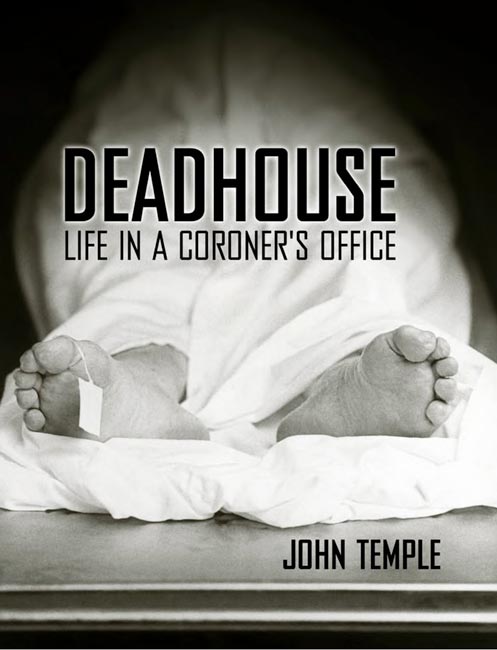 Deadhouse Deadhouse
Life in a Coroner's Office
John Temple
Narrated by Tim Lundeen
Available from Audible
Book published by University Press of Mississippi
Deadhouse: Life in a Coroner's Office chronicles the exploits of a diverse team of investigators at a coroner's office in Pittsburgh. Ed Strimlan is a doctor who never got to practice medicine. Instead he discovers how people died. Mike Chichwak is a stolid ex-paramedic, respected around the office for his compassion and doggedness. Tiffani Hunt is twenty-one, a single mother who questions whether she wants to spend her nights around dead bodies.
All three deputy coroners share one trait: a compulsive curiosity. A good thing too, because any observation at a death scene can prove meaningful. A bag of groceries standing on a kitchen counter, the milk turning sour. A broken lamp lying on the carpet of an otherwise tidy living room. When they approach a corpse, the investigators consider everything. Is the victim face-up or down? How stiff are the limbs? Are the hands dirty or clean? By the time they bag the body and load it into the coroner's wagon, Tiffani, Ed, and Mike have often unearthed intimate details that are unknown even to the victim's family and friends.
The intrigues of investigating death help make up for the bad parts of the job. There are plenty of burdens-grief-stricken families, decomposed bodies, tangled local politics, and gore. And maybe worst of all is the ever-present reminder of mortality and human frailness.
Deadhouse also chronicles the evolution of forensic medicine, from early rituals performed over corpses found dead to the controver-sial advent of modern forensic pathology. It explains how pathologists "read" bullet wounds and lacerations, how someone dies from a drug overdose or a motorcycle crash or a drowning, and how investigators uncover the clues that lead to the truth.
John Temple is assistant professor of journalism for the P. I. Reed School of Journalism at West Virginia University. He is the co-editor of Cancer Stories: Lessons in Love, Loss, and Hope. He was a staff writer at both the Pittsburgh Tribune-Review and the Tampa Tribune, and his work has been published in American Journalism Review.
REVIEWS:
“In 2000 Pittsburgh journalist Temple spent time in the Allegheny County Coroner's Office, riding out with its personnel on calls to collect bodies and returning to watch the autopsies. Temple imparts a general impression of forensic pathology, and his accounts of two female interns' reactions to the sights and smells provide a reality check for readers considering the career. Tracy and Carey learn the ropes and the lingo of the macabre from a staff that has seen it all—murders, suicides, overdoses. The newbies absorb from the veterans the necessary distance to perform the job, especially on "floaters and stinkers," described here in unsparing detail. Occasionally, the chief of the office glides past the dissection tables dispensing advice, and since he is the nationally famous Dr. Cyril Wecht, his employees pay attention. In between specific cases, Temple provides minihistories of the office of coroner, how it differs from that of a medical examiner, and the techniques of forensics. Writing evenly and efficiently, Temple will enlighten fans of the CSI television shows.”
—Booklist “Builds in intensity as the reader conquers misgivings about the subject, acquiring all kinds of random expertise in the process.”
—Madeleine Blais, author of Professional Nursing Practice “Forensics buffs hungry for more will welcome John Temple's "Deadhouse" as an unusually intimate look inside the county morgue.”
—Jessica Snyder Sachs, author of Corpse: Nature, Forensics, and the Struggle to Pinpoint Time of Death
|

